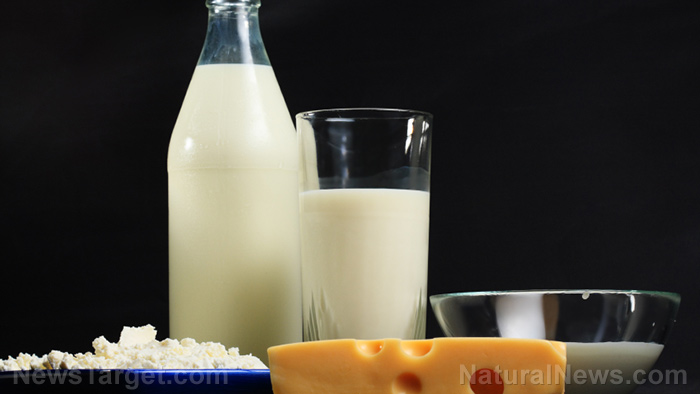Desperate: Dairy study claims drinking more milk will reduce diabetes, hypertension
05/29/2017 / By Amy Goodrich

Thanks to a rapidly growing community of health-conscious consumers, the dairy industry has seen its profits plummet over the last several years. Though raw milk was once a wholesome, nutrient-rich drink, today’s milk is pumped with hormones, sugar, and other health damaging substances. The idea that we need to consume calcium-rich milk to sustain healthy bones is quickly fading. Therefore, the industry is coming up with other ways to make sure we drink some every day.
According to new research, conducted by scientists at the National University of Singapore (NUS), people who drink at least eight ounces of milk every day have a 12 percent lower risk of type 2 diabetes and a six percent lower risk of hypertension.
For both studies, the researchers analyzed data from the Singapore Chinese Health Study of 63,257 middle-aged and elderly Chinese, enrolled in the study between 1993 and 1998. All participants had no history of hypertension or cardiovascular diseases when they signed up.
Additional information was collected during two follow-up interviews, conducted between 1999-2004 and 2006-2010. The study was a collaboration with the Singapore Ministry of Health, funded by grants from the U.S. National Institutes of Health.
To standardize the study methodology, the researchers focused on only one racial group to rule out dietary differences that arise from cultural factors. However, Prof Koh Woon Puay, who led the research, noted that the health benefits of milk are applicable to all racial groups and ages. Dietary intake patterns were determined using a 165-question survey.
Ice cream to reduce the risk of diabetes and hypertension — Really?
These two NUS studies are the first-of-their-kind to show a positive effect of milk on high blood pressure and type 2 diabetes in an Asian population that traditionally has a low consumption of dairy products. Similar observations were made for the regular consumption of other dairy products such as yogurt, Milo, Yakult, Ovaltine, Horlicks, frozen yogurt, and ice cream, reported Straits Times.
Yes, you read that right. If we believe these recent research papers, then ice cream, among other highly processed dairy products, will protect your body against hypertension and type 2 diabetes. This smells like dairy industry-funded research. Don’t you think?
The researchers also considered the use of butter in bread and dairy products in cooking procedures of local dishes to get an accurate estimate of the total dairy intake among the Chinese population living in Singapore.
“Our findings indicate that drinking a cup of milk daily may be beneficial for health; thus those who do not have a problem tolerating dairy products may enjoy it as a potential healthy choice,” said the study’s authors, Dr. Talaei and Prof Koh.
Today, the number of people with diabetes has skyrocketed in America, with some 30 million people living with the disease. This is more than three times the number recorded in the early 90s, according to the 2014 National Diabetes Statistics Report.
Fortunately, there is an easy solution to the fast-growing problem. Not entirely surprising, the answer isn’t coming from the medical world since in more than 90 percent of all type 2 diabetes cases, poor lifestyle choices are the primary culprit. In fact, the medical world isn’t interested in preventing, reversing, or curing diabetes, since managing diabetes is so incredibly profitable for the pharmaceutical industry.
Natural News just released a new book, “Reversing Type 2 Diabetes: Evidence-based strategies for reversing type 2 diabetes that your doctor doesn’t know and drug companies hope you never find out,” that shows how you can easily prevent, reverse, or cure the disease by eating healthy foods and engaging in daily exercise.
Find more diabetes-related health news and natural prevention strategies at DiabetesScienceNews.com.
Sources include:
Tagged Under: dairy, dairy industry, diabetes, fake news, high blood pressure, hypertension, Type 2 Diabetes




















